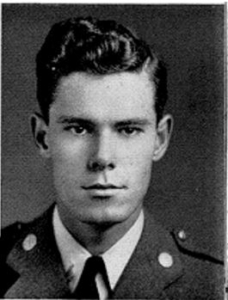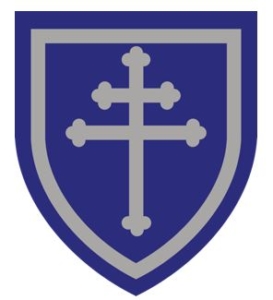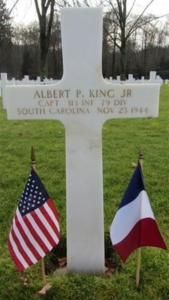Scroll of Honor – Albert Powhatan King, Jr.
Epinal
Written by: Kelly Durham
On a plateau 100 feet above the Moselle River near the village of Dinozé in northeastern France, rows of white markers stand vigilant witness to the sacrifice of American lives in World War II’s struggle against tyranny. More than 5,200 American service members are buried on the pristine acres of the Epinal American Cemetery, including Albert Powhatan King, Jr. of Ninety Six.
vigilant witness to the sacrifice of American lives in World War II’s struggle against tyranny. More than 5,200 American service members are buried on the pristine acres of the Epinal American Cemetery, including Albert Powhatan King, Jr. of Ninety Six.
Bill King majored in agronomy and was selected for membership in Kappa Alpha Sigma, the Clemson chapter of the American Society of Agronomy. He attended ROTC summer camp at Fort McClellan, Alabama and served as a second lieutenant in Company B, 1st Battalion, 1st Regiment in the Cadet Brigade.
Following his graduation on June 2, 1941, King reported for active duty at Fort Jackson and was assigned to the 8th Infantry Division. During his time there, he married the former Bessie Davis of Columbia. In 1943, their daughter Nancy was born.
King was transferred to Camp Wolters, Texas and Fort Benning, Georgia before shipping overseas as a replacement officer in September 1944. Upon reaching France, King was assigned to the 313th Infantry Regiment of the 79th Infantry Division. The division was then engaged in severe fighting in the Forêt de Parroy in northeastern France west of Strasbourg. The 79th was attached to the US Seventh Army which had come ashore across France’s Mediterranean coast in August and attacked northward. Now, the Seventh, which included General Philippe LeClerc’s French 2nd Armored Division, was closing in on Strasbourg, which had been occupied by the Germans for more than four years.
 On Sunday, November 19, the 79th broke through to Sarrebourg, just 40 miles west of Strasbourg. Allied artillery overwhelmed German defenders, opening the road to Strasbourg. As the Germans withdrew, the 79th moved in. Four days later, as King’s Company C of the 313th Infantry Regiment enjoyed its Thanksgiving lunch, orders came to move into an area that the regiment believed was secure. The company moved out in a convoy with Captain King guiding the way in the lead jeep. As King stood to direct his company, a German sniper shot him through the forehead. King exclaimed, “Oh my God, men!”—and died. He was buried with full military honors the following day at Epinal.
On Sunday, November 19, the 79th broke through to Sarrebourg, just 40 miles west of Strasbourg. Allied artillery overwhelmed German defenders, opening the road to Strasbourg. As the Germans withdrew, the 79th moved in. Four days later, as King’s Company C of the 313th Infantry Regiment enjoyed its Thanksgiving lunch, orders came to move into an area that the regiment believed was secure. The company moved out in a convoy with Captain King guiding the way in the lead jeep. As King stood to direct his company, a German sniper shot him through the forehead. King exclaimed, “Oh my God, men!”—and died. He was buried with full military honors the following day at Epinal.
Albert Powhatan King, Jr. was awarded the Purple Heart. He was survived by his wife, their daughter Nancy, his father, four sisters, and his brother Harry, a member of Clemson’s Class of 1944 who was then a lieutenant serving at Fort  Benning, Georgia. King’s Clemson story did not end with his death. His former Clemson roommate, James MacMillan, married his widow Bess after the war. King’s daughter Nancy was one of the first women accepted to Clemson, though the college’s lack of a nursing curriculum led her to enroll elsewhere. In all more than a dozen of King’s relatives subsequently attended Clemson.
Benning, Georgia. King’s Clemson story did not end with his death. His former Clemson roommate, James MacMillan, married his widow Bess after the war. King’s daughter Nancy was one of the first women accepted to Clemson, though the college’s lack of a nursing curriculum led her to enroll elsewhere. In all more than a dozen of King’s relatives subsequently attended Clemson.
The cemetery at Epinal is poignant memorial to the spirit and sacrifice of the young men who gave their lives to liberate France, defeat fascism, and restore freedom to western Europe.
For more information about Albert Powhatan King see:
https://soh.alumni.clemson.edu/scroll/albert-powhatan-king/
For additional information about Clemson University’s Scroll of Honor visit:
https://soh.alumni.clemson.edu/
